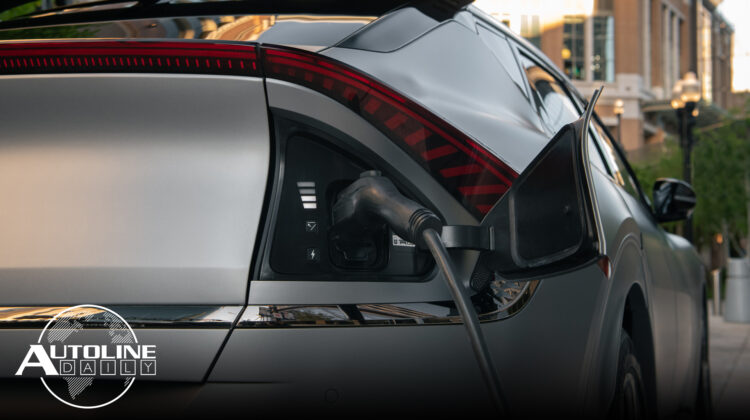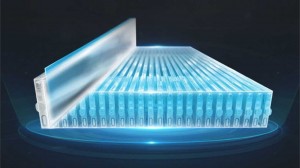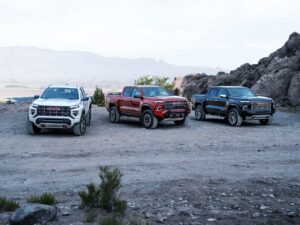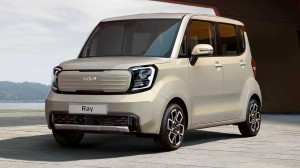
Listen to “AD #3382 – Ralph Nader Attacks Tesla FSD; Tesla Goes to 2-Shifts in Berlin; Used Car Prices Still Soaring” on Spreaker.
Follow us on social media:
Runtime: 9:44
0:08 Rivian Loses $1.7B, Burns $3B In Cash
0:56 EU & South Korea Oppose U.S. EV Credits
1:35 U.S. Miners Struggle to Meet EV Deadline
3:13 Tesla Buys Blade Batteries from BYD
3:48 City of Beijing Unveils 5-Year EV Charging Plan
4:33 China Car Parc Surges To 312M Vehicles
4:57 Mazda Backing Away from Chinese Suppliers
5:58 All-New GMC Canyon
7:16 Kia Ray EV Now 12 Years Old
8:05 NYC Floats Congestion Charge…Again
Visit our sponsors to thank them for their support of Autoline Daily: Bridgestone, Intrepid Control Systems, Schaeffler and Teijin Automotive.
This is Autoline Daily, the show dedicated to enthusiasts of the global automotive industry.
RIVIAN LOSES $1.7B, BURNS $3B IN CASH
Rivian posted its second quarter earnings and the numbers show that it isn’t easy being an EV startup in the middle of a global pandemic, a chip shortage, a war and with sky high inflation. The company only sold 4,401 vehicles in the last three months. That brought in $364 million in revenue, but expenses far exceeded that and Rivian posted a net loss of $1.7 billion. It also burned through more than $3 billion in cash, though it still has nearly $15 billion of cash in the bank. Interestingly, Rivian got an average of $82,700 for each of the vehicles it sold.
EU & SOUTH KOREA OPPOSE U.S. EV CREDITS
The new EV tax credits in the U.S. have not even been signed into law by President Biden yet, but the European Union and South Korea say they violate the rules of the WTO, or the World Trade Organization. The EU says it discriminates against foreign producers. South Korea says it does that as well as violating the free trade agreement between the U.S. and South Korea. To qualify for the full credits EVs pretty much have to have batteries that were manufactured in the U.S. The EU and South Korea are asking for amendments to the legislation that would make their EVs eligible.
U.S. MINERS STRUGGLE TO MEET EV DEADLINE
But it’s going to be very difficult for the U.S. to meet its own domestic content rules for EV batteries. Reuters reports that mining companies are going to struggle to produce enough raw materials needed for batteries in the time table stipulated by the legislation. It says that 100% of the batteries have to be made in the U.S. by 2030. And the raw materials have to come from the U.S. or a few other countries that qualify because they have free trade agreements with the U.S. While it takes about 2 years to build a battery plant from scratch, it takes 7 years to open a new mine. The mining companies are very eager to expand their operations, and say they can meet the target, but they say it’s going to be very challenging.
TESLA BUYS BLADE BATTERIES FROM BYD
Tesla has always touted the advantages of the cylindrical batteries it uses in its cars. But BYD is now supplying blade batteries to Tesla at its Berlin gigafactory. Car News China cites a source at BYD that says the first Tesla Model Y’s with BYD’s blade design will roll off the line later this month or early next month. But Tesla’s gigafactory in Shanghai will not use these batteries. In addition to making batteries itself, Tesla buys them from Panasonic, CATL and LG.
CITY OF BEIJING UNVEILS 5-YEAR EV CHARGING PLAN
China is serious about growing the number of EVs out on its roads and to help increase adoption, the city of Beijing just released its latest five-year plan for expanding EV charging and battery swapping. It wants the network to service at least 2 million new energy vehicles by 2025. The plan includes installing 310 battery swapping stations by that time frame and 700,000 charging piles, the vast majority of which will be located in residential areas. What we call chargers, China calls piles. When completed, the furthest distance between piles in the city will be 3 kilometers or just under 2 miles.
CHINA CAR PARC SURGES TO 312M VEHICLES
And speaking of China, the Ministry of Public Security revealed there are now 408 million total motor vehicles in the country, of which, 312 million are automobiles. For comparison, as of 2021, there were nearly 290 million vehicles in the U.S., including medium and heavy-duty trucks.
MAZDA BACKING AWAY FROM CHINESE SUPPLIERS
And in one last bit of China related news, Mazda wants to reduce its reliance on parts built in the country because of COVID lockdowns. The automaker is asking suppliers to increase inventories in Japan and to produce more parts outside of China. Mazda reported it lost about $145 million in the most recent quarter due to supply issues caused by the lockdowns.
ALL-NEW GMC CANYON
Meet the new GMC Canyon, which we think looks a little more aggressive than the previous model. Like the new Chevy Colorado that debuted last month, the Canyon will come exclusively with a turbocharged 2.7L 4-cylinder engine. While it doesn’t say if it will come with the same three power levels as the Colorado, we suspect it will. And since the trucks are so similar, GMC is focusing on providing more information about its ultimate off-road trim, the AT4X. It comes standard with a factory lift kit and wider track thanks to Multimatic spool valve shocks and 17 inch beadlock wheels with 33 inch tires. Other standard equipment includes a front bumper bar, winch, trail light, skid plates and underbody cameras. Each trim level of the new Canyon features its own unique interior accents with top-line versions getting a bigger 11.3-inch infotainment screen and optional sunroof, which is a first for the truck. The new Canyon will go into production early next year and will have a starting price around $40,000. And you can order the AT4X right now, which starts at $63,350.
KIA RAY EV NOW 12 YEARS OLD
Did you know Kia has been selling electric vehicles since 2011? It’s true. But the reason you might not know is because the model is sold exclusively in South Korea. This is the Kia Ray EV, which just got a major facelift for the 2023 model year. Its design is much more in line with the rest of Kia’s lineup and features an updated grille and LED lighting in the front and rear. While all of the technical specs will come with its full debut next month, the current Ray EV is powered by a 50 kW or 67 horsepower electric motor, which is fed by a 16.4 kWh battery pack that provides 138 kilometers or 86 miles of range on the outdated NEDC test cycle.
NYC FLOATS CONGESTION CHARGE…AGAIN
New York City has some of the busiest streets in the world, so it’s considering a congestion fee to reduce traffic. Drivers would be charged once per day to go into the city’s central business area. A recent report by the Metropolitan Transit Authority recommends charging between $5 and $23 depending on the time of day. It’s believed that this could reduce the number of vehicles by 15-20% and generate as much as $15 billion a year. Other major cities are or will be doing this, and former New York City Mayor Michael Bloomberg proposed it, too. But it went down in flames with vociferous public opposition.
But that brings us to the end of this week. Thanks for making Autoline a part of your day and I hope you have a great weekend.
Thanks to our partner for embedding Autoline Daily on its website: WardsAuto.com
Seamus and Sean McElroy cover the latest news in the automotive industry for Autoline Daily.








